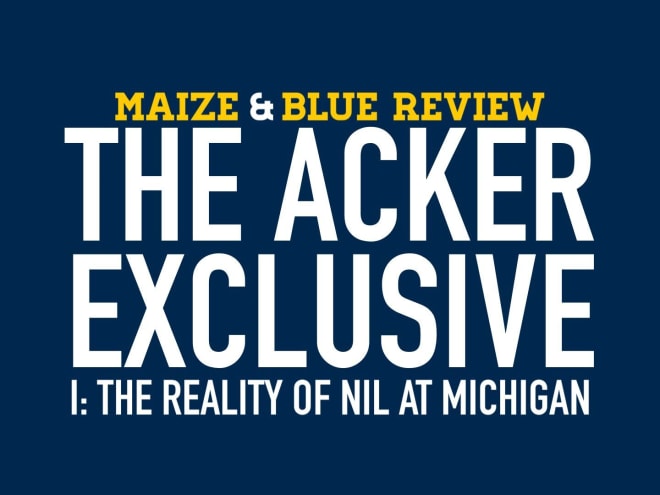The Acker Exclusive Part I: The reality of NIL at Michigan

Jordan Acker is entering his fourth year as the chair of the Board of Regents at the University of Michigan.
Acker, who's still yet to turn 40, was determined to give Michigan's Regents an injection of youth when he ran for office and assumed his position in 2018.
After graduating from U-M in 2006, he worked as an associate for the White House Office of Presidential Personnel before being appointed by former President Barack Obama in March 2011 to be an attorney-advisor to Secretary Janet Napolitano at the Department of Homeland Security. Ultimately, he decided to return home and work for his family company, Goodman Acker, P.C., in 2013.
In the summer of 2016, Acker dealt with extreme discomfort from back spasms. A doctor prescribed what he described as a simple medication. Shortly after beginning the drug, it would complicate his liver and put him in and out of the hospital. He credits the doctors at the University of Michigan Hospital for saving his life and inevitably inspiring him to run for office to show his gratitude for the institution that kept his heart beating.
Acker didn't plan to run for office deliberately. He and a group of friends were planning a trip to Iowa City to watch Michigan play the Hawkeyes when Acker found himself in a rabbit hole on the University's website. He accidentally came across the Board of Regents page by clicking the wrong button. Acker went through the page and asked himself who this group was and what happened next would change the course of his life and the University's future.
"I'm looking at this page, like, 'Who are these people? What do they do?' And I noticed a lot of these people are pretty old. And my buddy said to me, 'great! You're running for office now,'" and I told him that's ridiculous," Acker said on Sunday afternoon. "But there was nobody who was a millennial on the board, and nobody who attended or graduated college in the 21st century on the board. It felt like a great place for me to give back to a place that has given me so much."
"In the past, it's been decided by backroom deals and was a who's who, and I realized that, as a 34-year-old, if I tried to beg the right people, I'd never win."
Fast forward to 2018, and Acker, who totaled over 30,000 miles on his car going to every Democratic club in the state to get elected, won the race by defying the odds of his age through boots on the ground, face-to-face campaigning.
Acker was now the chair with an eight-year term of an eight-person Board of Regents.
Fast forward to the present day, and things have changed at the University.
In a three-part series, Acker sat down with Maize & Blue Review to discuss NIL, the misconceptions of Michigan admissions, the next president, and much more.
Here's how the series will go:
Part I: The reality of NIL at Michigan
Part II: The misconceptions about Michigan's admissions
Part III: A new presidential era
Part I: Michigan's confidence in its NIL strategy
It's no secret that NIL is an integral factor in recruiting a student-athlete in today's day and age. Of course, schools can't offer NIL, but they can create NIL opportunities through brands, alumni networks, and more that make it an attractive institution for a student-athlete to attend.
Many Michigan fans believe the University is behind in its efforts to drive home NIL and maximize its potential to bolster further recruiting efforts.
Because of the sensitivity of asking program heads about the topic, we can't ask these questions to Jim Harbaugh, Juwan Howard, or any head coaches within the University.
So uncovering the strategies of U-M's NIL direction was a tall task since its inception. But Acker pulled back the curtain and showed us what the Regents, in partnership with the programs, are doing to push the agenda on NIL.
"I'll tell you the way I see things is that we have this big academic portfolio, the hospital which is now half of the revenue of the University, and we have athletics. And I would say the areas with the most change and risk, as much as academics are changing, is the rate of speed that the medical side and athletics are changing. It's almost unrecognizable," he said. "I was the second trustee of any major University to speak out in favor of NIL. It was a huge deal because people didn't know that NIL was even going to be a thing at that point, or legalized a couple of months after that, and then become what it is now."
What was it like when NIL became legal?
Some schools, like Ohio State, ran with it and ended up seeing athletes like Quinn Ewers sign deals for over a million dollars, only to transfer out before completing one semester at the school.
Meanwhile, Michigan was slowing things down, analyzing, calculating, and thinking long-term about what NIL could do for its student-athletes and the institution's athletic success.
"From a policy perspective, we've been really focused on what NIL means for Michigan. We had our first session about it in January 2021. We had a long conversation with legislators ad people who work on the academic side and grapple with what's next for us. Where is this headed? Where does it take Michigan sports?" he stated. "We talk about it quite frequently because the world of athletics in the college landscape is changing dramatically and will probably be much different two years from now than it is right now."
"One of the things we talk about constantly is the reputation of the University. Of course, NIL plays a huge role in that. I think it would be really easy for a school to decide just to go full-on and use NIL for its benefit without any discernment of what the recognition from what your reputation might be, student-athlete relationship, and what the locker room might look like. And that's just not how we operate."
Athletic director Warde Manuel is like any other major school's AD in that he has those who love what he's done in his position and others who question what he's done.
In his case, it's far more of the former than the latter, but what matters most is those in charge believe his NIL strategy has been tremendous and a safe bet for the institution while still maximizing opportunities for the student-athletes.
"One reason why I think Warde's approach has been pretty good about NIL is that he's thinking about what this looks like 4-to-5 years down the line," Acker said. "Because there are many stories out there about an athlete going to school X because he thinks there's NIL opportunity Y before realizing 'I shouldn't make my decision based on a potential NIL deal my first day on campus.' It's one of the things you should consider, obviously, money-making ability, but it's one of many things. I think Michigan will be better served in the long term by the approach that we've taken."
Michigan fans are unhappy with the NIL efforts it's made so far. That's no secret. Maybe it's because there hasn't been a ton of glitz & glamour or key recruits who publicly share the NIL advantages of choosing Michigan.
The reality is Michigan has prioritized and utilized NIL.
Acker pulled back the curtain as to how.
"It's really interesting that Michigan is always considered to be "behind," when our NIL program wins awards, sells a lot of jerseys, and we do a lot of things that fit with the culture and the reputation of the school without stopping student-athletes from getting the NIL deals they deserve," Acker said. "I think, for Michigan, taking a more conservative approach makes a lot of sense. But that's not to say that Michigan's been left behind — Michigan is thinking about what the programs look like two-to-three years down the line."
Behind the scenes at Michigan, NIL is at the forefront as the hottest topic of conversation regarding athletics.
The theories of U-M's disdain, or negligence, of NIL have proved to be preposterous message board banter with no real grounding to it.
Michigan is using this new tool as a stepping stone for its recruiting efforts to improve its teams and maximize the potential of each athlete enrolled at the University, beyond just football & basketball.
With its reputation and identity at the forefront, U-M has taken the road less traveled in building up its NIL blueprint. What's to come is a sustainable, long-term plan that will last years down the road when this whole business looks even more absurd than it does now.
That's the plan, at least.
Stay tuned to M&BR as all three parts of The Acker Exclusive will release this week. Next up, we discuss admissions and the shocking misconceptions between perception and reality in U-M's admissions process, along with a new academic program Acker is working on forefronting to help solve admissions issues.
---
Not a subscriber to The Maize and Blue Review? Sign up today!
Discuss this article on our premium message boards
Follow our staff on Twitter @MaizeBlueReview, @JoshHenschke, @BrandonJustice_, @DanielDash_, @DennisFithian, @StephenToski, @Baird_CJ, @ZachLibby, @JimScarcelli, @TrevorMcCue
Subscribe to our podcast on Apple Podcasts, Google Podcasts, and Spotify
Subscribe to The Maize and Blue Review on YouTube!
Like The Maize and Blue Review on Facebook!
